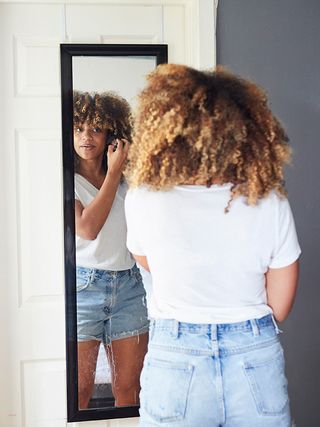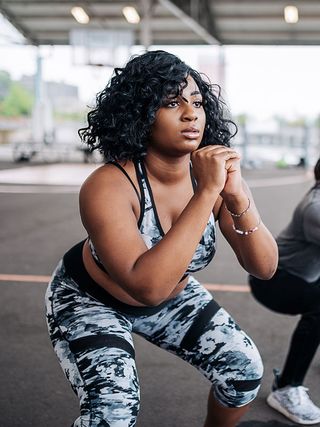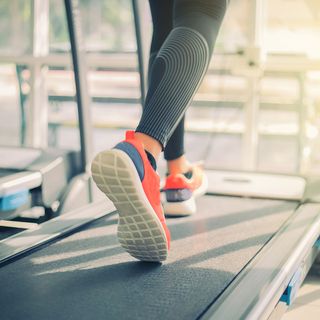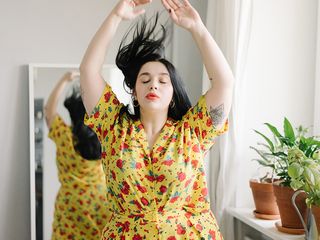This Is How Therapists Help Their Patients Practice Self-Love

In my 32 years of life, I've realized that loving yourself and being comfortable in your own skin is a journey, and there will always be a lot of ups and downs. Some days I feel so confident, both in appearance and ability, and know I can take on anything that comes at me. Other days, I am extremely insecure and vulnerable and judge everything single inch of my body, which in turn makes me feel like I'm doing everything wrong—at work, in my personal life, and even on social media.
I'm not alone in this, since I think it's safe to say that everyone has had problems with self-esteem at least once in their lives, and some experience negative feelings about their body more often than not. Those feelings of negativity can really get to you and can even affect your mental and physical health.

"Feeling bad about yourself and/or having negative body image can impact multiple aspects of a person's life," says Rachel O'Neill, Ph.D., an Ohio-based licensed professional clinical counselor and Talkspace provider. "First, focusing on perceived shortcomings can deprive you of the experience of being present in the moment. So for example, if you're out with friends but spending the whole night comparing yourself to them, it can certainly impact the overall experience of being with friends. Next, chronic stress can certainly impact a person's physical and mental well-being. So being concerned about one's appearance may naturally impact one's overall health."
In a 2018 paper, researchers analyzed 191 research articles, which included data from 165,000 people and concluded that age 60 is when most individuals reach their self-esteem peak, and it can last for a decade. While I was excited to find that out—and immediately texted my 60-something mom to ask her if her confidence levels were off the charts—I also realized that that's a long way away for me (and maybe you, my dear THE/THIRTY readers). Since many of us have decades left to go before we reach our supposed self-esteem peak, I talked to two therapists to find out how they help their patients cope with negative self-image and body issues—a lot of which we can use in our own lives. See what they had to say below.
It's important to note, though, that each person is different and these ideas and tips are by no means a set formula for you to follow. It's important to seek professional help that can be more tailored to your life, especially if you are experiencing signs of depression or anxiety. You can also call the Substance Abuse and Mental Health Services Administration for referrals or more information at 1-800-662-HELP (4357).
They Ask Patients to Think About the Thoughts They Have About Their Bodies

It all starts with a couple of questions to better understand how we really feel about our bodies, even thoughts we don't realize could be harmful. "One of the first things I ask is in regard to self-talk, I ask what kind of thoughts clients have when thinking about their body," says Madeleine DiLeonardo, MEd, LPC, NCC, a licensed professional counselor and founder of Mind Body and Soul by DiLeonardo Wellness. "For example, how they are treating themselves when they are trying on clothes, getting ready in the morning, or making decisions about food. A lot of times, clients don't realize that the narratives they have created about their bodies are very negative, and this constant cycle of negative self-talk directly impacts self-worth."
O'Neill has a similar approach: "I like to start by asking about the relationship the individual has with their body. When they think about their body, what thoughts come to mind? What feelings come to mind? How do they deal with those thoughts and feelings? What do they tell themselves about those thoughts and feelings? When have they felt the most comfortable with their body? When have they felt the least comfortable?"
They Try to Normalize the Situation

"I usually start by normalizing the experience of struggling with body image and body acceptance. Concerns about body appearance and preoccupation with perceived deficits in one's appearance is something that many people have experienced at various points in their life," says O'Neill. "I try to work with individuals to accept that these feelings may occur from time to time. I also try to help folks practice the idea of acceptance around body-related concerns and work with them on how to tolerate these feelings instead of working to avoid or escape them."
They Ask Patients to Stop With the Comparisons

Not comparing yourself to others is easier said than done, but controlling these thoughts can help a lot. "Avoidance of comparison is a big one. Rather than trying to look like someone else or wishing you looked different, can you focus on appreciating the positive characteristics you do have?" says DiLeonardo. "By more regularly identifying things you appreciate about yourself or thinking of a few positive things you can be grateful for, you can begin to move toward a healthier place in regard to body image. It's important to note that we are not working to change how your body looks; we are working to change how you think about the body you do have."
They Encourage Patients to Think About How Strong Their Bodies Are

"We tend to get so caught up in the perceived deficits in our body that we might not take time to celebrate the strengths within our bodies," O'Neill says. "So instead of focusing on things about their body that make them unhappy, I might encourage the individual to focus on practicing daily gratitude (for example, spend a few moments each day thinking about some area of their body or something about their body for which they are thankful)."
DiLeonardo encourages this line of thinking, too: "A great reframe is appreciating all that your body can do. Recognizing times that you are strong, capable, or that your body allows you to do things you love is important. If you start to think about ways you wish your body was different, a way to combat this is to think of specific examples of what your body does that you appreciate. We only get one body, and it is a vessel to do things like experience the world and love the people around us. Consider how much time you spend thinking about your body in a less-than-positive way. Is that worth it or adding value to your life?"
They Advise Patients Look at Social Media With Caution

As much as we love to be on social media, we do have to look at it with a discerning eye at times. Think about how many tries it took for you to get that perfect beach photo on vacation. Or just think about how you like to craft your persona on Instagram, in general. It's not always 100% real life, but sometimes we forget about that and start to compare our real lives to those perfectly curated lives of strangers on Instagram.
"It is really important to remember that the pictures we see on Instagram are specifically selected and often heavily edited. Bodies are perfectly posed and filtered in order to portray a certain image, and this is often not realistic. I'd also add that it's important to take inventory regarding who you are following on social media and what kind of content you're engaging with. Are the people you're following presenting as authentic? Does it add value for you or make you feel positive when you see their posts?" suggests DiLeonardo.

O'Neill suggests being mindful of your thoughts when you're scrolling. "Try to notice how you're feeling when you're looking at social media. Do you tend to notice that social media exacerbates some of your body image concerns? For example, do you find yourself following a bunch of fitness accounts only to feel bad about not measuring up to the ideal they set? Though some social media can help with body positivity, others might hurt by setting unrealistic expectations. Be aware of what you're feeling when you're on social media, and consider how social media can help increase your body positivity (instead of harming it)," she says.
They Encourage Patients to Do Things That Make Them Feel Good

One thing that helps? Exercise. And not exactly to lose weight but to stay active and get those endorphins going. "Research shows that short periods of regular exercise improve both your health and your mood. Moving your body and appreciating that movement is a great way to connect with your body," says DiLeonardo. "Also, identifying balance and times when you feel best in your body and striving for that. So if eating certain foods causes you to feel less than great in your body, that's an indicator that you could be taking care of yourself better. Similarly, if you know that you feel most confident when you shower and get dressed for the day or do your hair a certain way or are fresh-faced with no makeup, make it a priority to do that. The goal is to determine when you feel best in your own body (again not comparing to anyone else's) and striving for that!"
"Body-focused self-care is a nice way to practice being kind to one's body," O'Neill adds. "This would be things like eating healthy, getting enough sleep, and finding time for some physical activity. Practicing daily gratitude can also be a helpful way to gently refocus one's attention to a more positive space. Also, daily loving-kindness meditations can be a nice way to practice being kind and gentle with oneself."

They Remind Patients That It Takes Time

You can't really change deep-seated habits or lines of thinking that quickly. And like I mentioned earlier, it's a journey. "I encourage folks to view this as a process. Becoming more comfortable with one's body doesn’t happen overnight, and you may find that you make some progress only to then revisit some past struggles," O'Neill says. "Something that can be helpful is focusing on how the body feels and what the body can do instead of simply using looks or appearance as a metric for happiness."
They Recommend Patients Seek Out a Community

It's easier to talk it out with people who are experiencing what you're feeling or have been through it before. This is especially helpful for those of us who are dealing with negative body image issues, some of which is due to being differently abled or living with (or having gone through) an illness or condition. "If someone is differently abled, they can feel challenged by widespread misconceptions and negative stereotypes about people with disabilities. Debunking the narrow definitions of female beauty and focusing on positive characteristics regarding who you are can be helpful," DiLeonardo says. "Finding a supportive community and surrounding yourself with like-minded people who see your value and empower you is also beneficial. It's important to be kind to oneself and recognize all that you are despite experiencing challenges."
Despite its many dark flaws, the internet can be a helpful place for finding a community if you can't find one in your city. "There may be social media sites for individuals with certain disabilities and/or conditions that focus on body positivity and celebrate body resiliency," O'Neill recommends. "I would encourage the individual to find ways to feel more connected with how they view their body and how they focus on their resiliency."
They Encourage Patients to Take Care of Themselves

At the end of the day, our main focus should be caring for our bodies because we've only got one. Drown out the negative noise from the outside and zero in on how you can take care of your health and yourself. As to how people can feel more comfortable with themselves, DiLeonardo advises, "Avoiding things like dieting culture, body-shaming conversations, and external validation and focusing more on taking care of the body that you have right now. Additionally, can you view your body more holistically—including your mental, emotional, physical, and relational parts? Who you are as a person equates to so much more than what your arms look like. Trying to keep this in mind while taking care of yourself allows for space to be more comfortable in your body."

Next: It's Time to Stop Feeling Guilty About Not Getting Everything Done
This article was originally published at an earlier date and has since been updated.
Disclaimer
This article is provided for informational purposes only and is not intended to be used in the place of advice of your physician or other medical professionals. You should always consult with your doctor or healthcare provider first with any health-related questions.
Sarah is lifestyle writer and editor with over 10 years of experience covering health and wellness, interior design, food, beauty, and tech. Born and raised in Los Angeles, she attended New York University and lived in New York for 12 years before returning to L.A. in 2019. In addition to her work on THE/THIRTY and Who What Wear, she held editor roles at Apartment Therapy, Real Simple, House Beautiful, Elle Decor, and The Bump (sister site of The Knot). She has a passion for health and wellness, but she especially loves writing about mental health. Her self-care routine consists of five things: a good workout, “me” time on the regular, an intriguing book/podcast/playlist to unwind after a long day, naps, and decorating her home.




